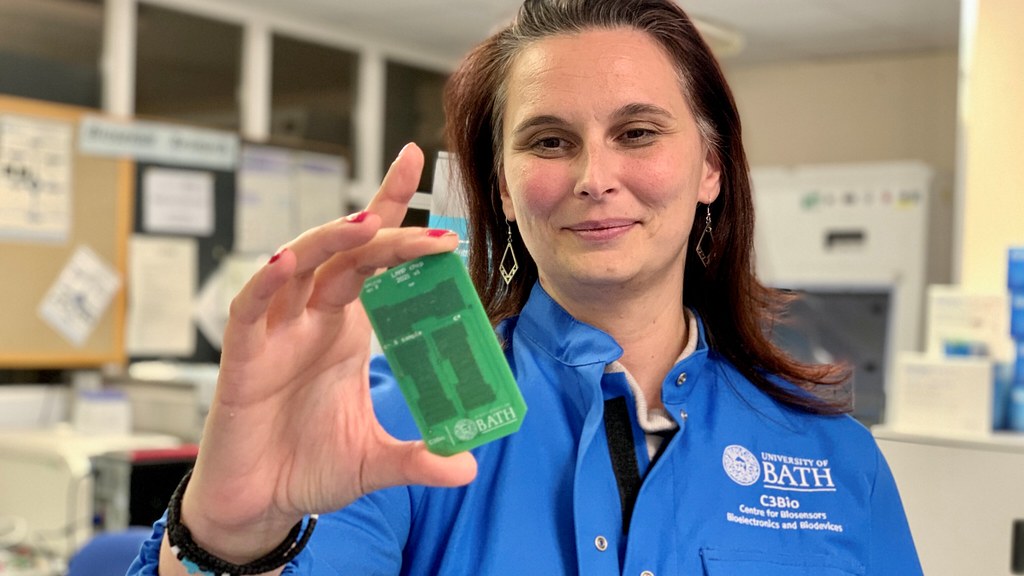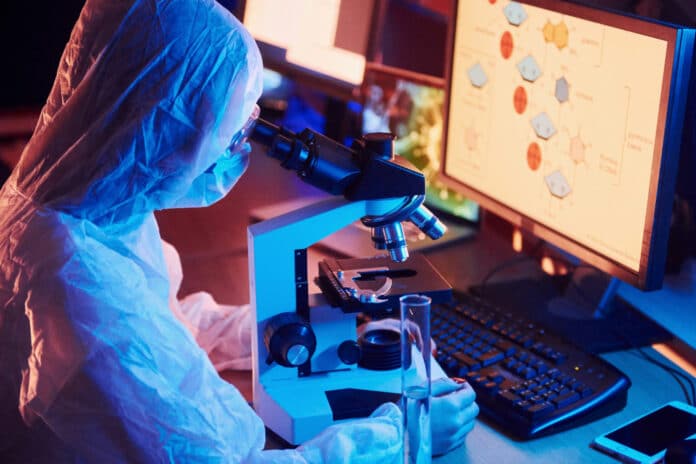Engineers at the University of Bath have created a super-fast virus test device. It can give you results like those from a lab in just three minutes. They call it the “world’s fastest Covid test.”
The LoCKAmp device is still a prototype. It uses a fantastic technology called “lab on a chip.” This device can quickly and inexpensively detect Covid-19 from a nasal swab. The team behind it believes it can be adapted to find other harmful germs like bacteria or even diseases like cancer.
Here’s how it works: It takes a sample from your nose, then does some unique chemistry to look at the genetic stuff in that sample. Then, you can see the result on your smartphone. It’s swift and easy.
The LoCKAmp test differs from the standard lateral flow tests we’ve seen during the pandemic. It uses the same high-quality genetic-based testing methods as labs, like PCR tests. This means it’s super accurate and fast, giving results in just three minutes. It’s one of the quickest Covid-19 tests ever reported.
What’s even better is that this test can be made quickly and inexpensively with standard components and printed circuit boards. It can be produced on a large scale, which could help healthcare providers worldwide. The research team believes that a company with the right know-how could turn the LoCKAmp into a small, portable device, making it useful for remote healthcare settings.
The research team is talking to schools and businesses. It is open to more partnerships to start making the LoCKAmp device.
You can learn more about the device in the research paper “LoCKAmp: lab-on-PCB technology for virus detection in under 3 minutes.” It’s published in the Lab on a Chip journal.
Dr Despina Moschou, from Bath’s Centre for Bioengineering & Biomedical Technologies (CBio), led the research. She said: “We started researching and developing LoCKAmp during the second wave of Covid in the UK. We were confident we could create a portable, low-cost device to carry out genetic virus identification, like a PCR test, within 10 minutes. We have done that, but it can work within just three minutes.”
“This is an amazing display of the possibilities of lab-on-a-chip technology, and given the low cost and adaptability of the technology to detect a range of conditions, a potentially precious and unique tool for a range of healthcare settings.” She added
The team can make the LoCKAmp device fast and inexpensively because they use everyday printed circuit board tech and large-scale manufacturing. It has two parts: a portable testing unit and disposable cartridges for each test.
The testing unit might cost around £50 when they make a lot of them, and the test cartridges, which currently cost £2.50, could be less than 50 pence each.
LoCKAmp is a clever device that uses RT-LAMP to find specific bits of virus RNA quickly. It’s better than PCR testing because it’s more sensitive, faster, and straightforward. The device works at a single, steady temperature of 65°C, which makes it compact and energy-efficient. Plus, you don’t need to do anything special to the swab samples before using it.

Here’s how it works: The device has tiny channels on a circuit board with super-thin heaters. When you put a swab sample in, it warms up the sample and releases the virus’s genetic material. Then, it multiplies the material using RT-LAMP chemicals. If the virus RNA is there, it lights up, showing a positive test.
The LoCKAmp device was created by a team from the University of Bath, along with people from the University of Glasgow and the John Innes Centre. They tested it with COVID-19 patient swabs from Bath’s Royal United Hospital Trusts, even after the pandemic slowed because they saw its potential.
The LoCKAmp can do more than analyze nasal swab samples. It can also be used for monitoring viruses like COVID-19 in communities by testing wastewater. Although this method needs some preparation of the wastewater samples, it can provide valuable real-time information on the presence and spread of diseases like COVID-19. This approach offers a community-wide perspective without relying on individual testing.
Professor Barbara Kasprzyk-Hordern, from Bath’s Department of Chemistry and Institute for Sustainability, is an expert in environmental epidemiology and contributed to the research. She said: ‘With LoCKAmp technology providing both low cost and real-time genetic target identification and quantification, we’re getting ever closer to real-time pathogen tracking. This opens exciting opportunities enabling the establishment of early warning systems utilizing wastewater for pathogen surveillance in communities.”
The ‘Lab on a Chip’ Genetic Test Device, LoCKAmp, has emerged as a game-changing tool for rapid and highly accurate virus detection. Its innovative technology, speed, and adaptability for community-level monitoring through wastewater analysis hold promise for reshaping infectious disease diagnostics and surveillance. Further collaborations and partnerships aim to bring this remarkable technology into broader use.
Journal reference:
- Sotirios Papamatthaiou, James Boxall-Clasby et al., LoCKAmp: lab-on-PCB technology for <3 minute virus genetic detection. Lab on a Chip. DOI: 10.1039/D3LC00441D.
